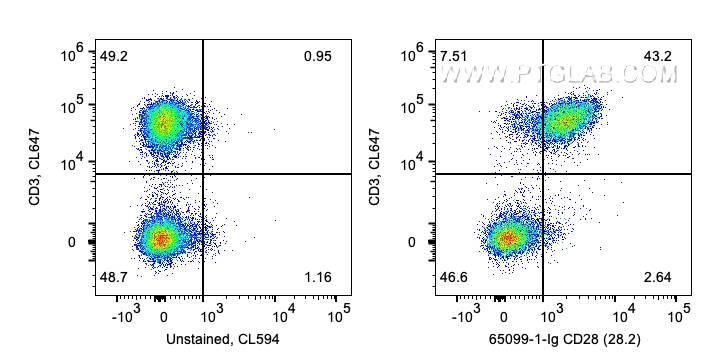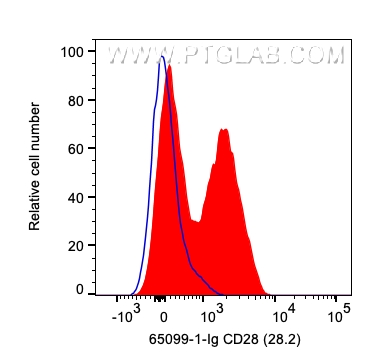验证数据展示
经过测试的应用
| Positive FC detected in | human PBMCs |
推荐稀释比
| 应用 | 推荐稀释比 |
|---|---|
| Flow Cytometry (FC) | FC : 0.2 ug per 10^6 cells in 100 μl suspension |
| This reagent has been tested for flow cytometric analysis. It is recommended that this reagent should be titrated in each testing system to obtain optimal results. | |
| Sample-dependent, Check data in validation data gallery. | |
发表文章中的应用
| IHC | See 1 publications below |
产品信息
65099-1-Ig targets CD28 in FC, IHC, Cell treatment applications and shows reactivity with Human samples.
| 经测试应用 | FC Application Description |
| 文献引用应用 | IHC, Cell treatment |
| 经测试反应性 | Human |
| 文献引用反应性 | human |
| 免疫原 |
N/A 种属同源性预测 |
| 宿主/亚型 | Mouse / IgG1, kappa |
| 抗体类别 | Monoclonal |
| 产品类型 | Antibody |
| 全称 | CD28 molecule |
| 别名 | CD28, CD28 molecule, Tp44 |
| 计算分子量 | 220 aa, 25 kDa |
| GenBank蛋白编号 | BC093698 |
| 基因名称 | CD28 |
| Gene ID (NCBI) | 940 |
| ENSEMBL Gene ID | ENSG00000178562 |
| RRID | AB_2918401 |
| 偶联类型 | Unconjugated |
| 形式 | Liquid |
| 纯化方式 | Affinity purification |
| UNIPROT ID | P10747 |
| 储存缓冲液 | PBS with 0.09% sodium azide, pH 7.3. |
| 储存条件 | Store at 2-8°C. Stable for one year after shipment. |
背景介绍
CD28 (T-cell-specific surface glycoprotein CD28), also known as T44 and Tp44, is a 44 kD disulfide-linked homodimeric type I glycoprotein (PMID: 2162180). It is a member of the immunoglobulin superfamily and is expressed on most T lineage cells, NK cell subsets, and plasma cells (PMID: 2162180, 8386518). CD28 may affect in vivo immune responses by functioning both as a cell adhesion molecule linking B and T lymphocytes and as the surface component of a novel signal transduction pathway (PMID: 2162180, 3021470). CD28 binds both CD80 and CD86 with a highly conserved motif MYPPY in the CDR3-like loop (PMID: 15696168, 7964482). CD28 is considered a major co-stimulatory molecule, inducing T lymphocyte activation and IL-2 synthesis, and preventing cell death (PMID: 1348520).
实验方案
| Product Specific Protocols | |
|---|---|
| FC protocol for CD28 antibody 65099-1-Ig | Download protocol |
| Standard Protocols | |
|---|---|
| Click here to view our Standard Protocols |
发表文章
| Species | Application | Title |
|---|---|---|
Cancer Cell Int Comprehensive analysis of prognostic immune-related genes and drug sensitivity in cervical cancer. | ||
J Transl Med Scoring model based on the signature of non-m6A-related neoantigen-coding lncRNAs assists in immune microenvironment analysis and TCR-neoantigen pair selection in gliomas | ||
Aging (Albany NY) An integrated bioinformatic investigation of focal adhesion-related genes in glioma followed by preliminary validation of COL1A2 in tumorigenesis |



